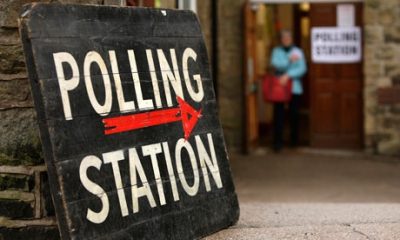Don’t Just Do Something – Sit There! (Ros' Blog)

I think that Brenda from Bristol spoke for many, if not most, of us when she was told that our Prime Minister has called a snap election. You have probably seen her on TV or social media, exclaiming, “You’re joking! Not another one!” Suddenly as well as the uncertainty of what Brexit is going to entail, we find ourselves plunged into the turmoil of another general election (just 35 days after a local election, for many of us!). Add to this the number of volatile and unpredictable national leaders around the world, and it could accurately be described as a time of transition and insecurity. Rather like the time the young prophet Isaiah found himself in.
It had been a long reign. Uzziah had been only sixteen when he came to the throne, and now he was sixty-eight. He was soon to die, and his son Jotham to succeed him. His life was cut short by leprosy, or his reign might have been longer. Nevertheless there were many people well into adulthood who had never known life under any other king, just as people of my generation and younger have never known any monarch but Elizabeth II (although after the onset of his leprosy, Uzziah’s son Jotham ruled as co-regent with him, as he had done with his own father for the first twenty-four years of his reign).
This time of transition, with the death of Uzziah and accession of Jotham, coincided with the expansion of the Assyrian empire, which was a real and present threat to the nation of Israel. No wonder, then, that Isaiah found himself drawn to the temple at this time of national turmoil, to seek some divine counsel and assurance for the nation’s future.
In the year that King Uzziah died, the young prophet Isaiah was in the temple. And the encounter which he had there forced him to confront his own sin and frailty. There is no evidence that he was an especially wicked person – on the contrary, he was a godly prophet, in the temple because he wanted to seek God. And yet by contrast with God’s holiness he became acutely conscious of his own inner uncleanness and the impurity both of his own life and speech and that of his nation, which had strayed from God. As a result of this encounter, Isaiah’s life took on a new direction which was to change not only the course of his future, but that of his nation and the generations that followed him.
Whether or not you share Brenda’s reaction to news of another election, you might view it with despondency if you are prevented from getting out and voting because you live in one of the 67% of wards where the polling station has significant access barriers. Scope’s survey of polling stations heard complaints from voters of: access ramps with a drop off the end leading to doors too narrow for a wheelchair; voters having to mark their ballot papers outdoors in full view of other voters; and blind people anxious about inadvertently spoiling their ballot papers because of being unable to see where to place their mark. One man described being left sitting out in the rain while a portable ramp was moved into place, and then being asked if his wife would be voting on his behalf.
Postal and proxy voting is available to those unable to access polling stations, and perhaps in the not-too-distant future we will have online voting too. But whatever your intentions about voting, whatever the access barriers you have to overcome, and no matter which party or candidate you favour, can I encourage you to take a leaf out of Isaiah’s book at this time of national transition?
Voting is important, of course – especially, I think, if you are a woman; women made great sacrifices for us to have the right to vote. But far more important is to be in the place of worship seeking God both for ourselves as individuals and for our nation. Like the Israelites of Isaiah’s time, we live in a nation that no longer puts God first and does not consult His will before national policy is enacted. Listening to debates from the House of Lords in the past couple of years it has often seemed as if the Archbishop of Canterbury has become the nation’s 'Jiminy Cricket' – the one voice of godly conscience reminding our nation and parliament of our moral obligations above and beyond party politics. Praise God for him and his courage in speaking out for what is right.
Isaiah’s encounter with God led him to a place of deep contrition, and from there to a new abandonment to the will of God, ready to go anywhere and do anything that God had in store for him. It became a personal repentance, a personal challenge and a personal adventure. I doubt very much whether he had any idea at the outset of the extent to which it would change the nation and the world. Yet just two short chapters later we have him announcing the coming of Messiah, God with us: “The virgin will conceive and give birth to a son, and will call him Immanuel.”
So I would like to encourage you: don’t just do something - sit there! Don’t just vote, or campaign, or whatever you do during an election, but sit there, in the quiet, and spend some time, like Isaiah, seeking God. Perhaps – and I say this to myself as much as to anyone reading this – if we spend as much time seeking a face-to-face encounter with God over the next six weeks as we do engaging in political debate or in deciding how to vote, the difference to our nation could be far greater than the one decided at the ballot box.

